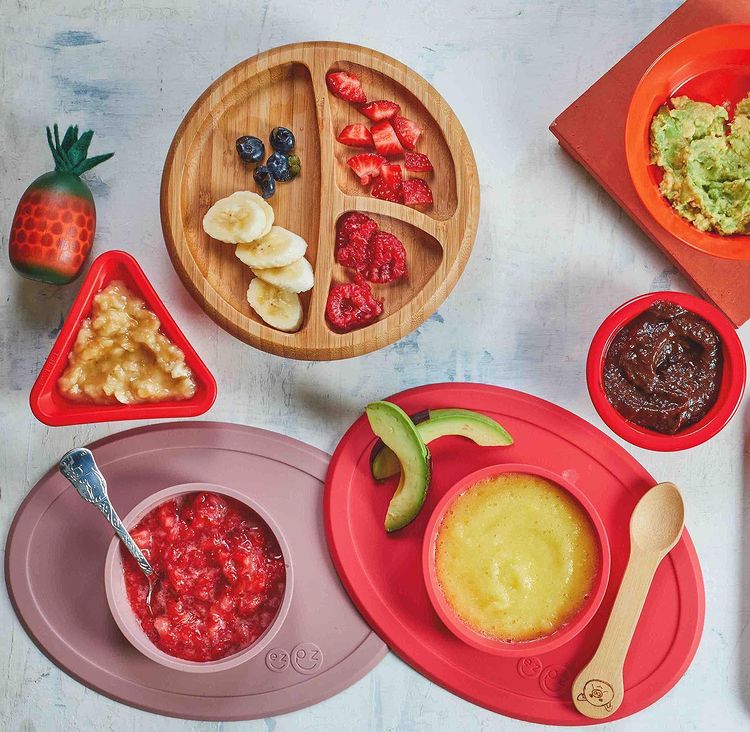There are many perspectives on health in our society and everyone has a different opinion on it. Some countries have high percentages of a heavily overweight population and scientists say that this partly stems from wrong diets that are introduced at a very early age. There are actually major differences between the nutrition of infants and children. But what does the correct nutrition for a baby look like? That is what we will show you in the following article.
TIP 1: Breastfeeding or infant milk?
Breastfeeding remains a controversial topic for many people. Often, the biggest point of criticism is the fact that it is regarded as an unnatural sight, because breasts have been extremely sexualised. Of course, mothers have to decide for themselves which form of feeding they want to choose for their baby. The WHO advises to solely breastfeed or use infant milk in the first six months of a baby’s life. However, from a scientific point of view, it isn’t really possible to determine the best time span or the influence of breastfeeding on mother and child. Some positive and also scientifically proven factors of breastfeeding involve a lower risk for respiratory infections and diabetes type 2. Some also believe that babies’ immune systems are built up more quickly when they are breastfed. From the sixth month onwards, your baby can slowly start to eat complementary food. For the best effect, choose fresh, organic foods.

TIP 2: The most important nutrients
For babies, omega 3, iron, calcium and vitamin C are especially important. All of those nutrients support important functions in our body. Omega 3 is an essential fatty acid and cannot be produced by the body itself. It is especially important for micro processes such as cell metabolism, hormone production and the building of the immune system. Important foods include salmon, spinach and avocados. Iron is also really important for babies, because it supports blood formation and regulates the oxygen transport in the blood. The intake of iron is a bit more complicated though. A lot of it is contained in red meat, so if you’re eating a vegetarian diet, consume lots of spinach, chard and broccoli instead. The function of calcium is probably common knowledge and its intake through foods is relatively easy. It is essential for bone formation as well as bone stability. Dairy products, for example, have a high calcium content. Other great sources of calcium are almonds, coconut and sesame seeds. However, remember to serve them in a processed form to your baby, as almond butter, for example. Note that not all kinds of nuts are good for your baby. Peanuts, for instance, are hardly digestible for babies, they can also trigger allergies and should be avoided in the first year. Vitamin C is a water-soluble vitamin and has diverse functions. It supports the processing of iron and strengthens the immune system. For babies, the best option is pureed fruit, because juice often contains too much sugar.

TIP 3: Eating habits
Organic foods are always the best choice for feeding your baby. You can try new things and feed your child a balanced diet. Of course, there might be things your baby doesn’t like, or it might be full faster. In these situations, many babies tend to spit out their food or make a face. If that happens, try the same food again later. When your child reacts the same way again, it might be possible that you won’t have to make a third try. Due to their limited options, babies mainly focus on watching everything around them; so they often imitate their parents when it comes to eating. Pay attention to which dishes mom and dad struggle with as well and see how your baby reacts to that food. General eating habits are imitated as well, that includes playing with food. Many parents make the mistake of introducing food as a game, which often results in some annoying experiences. Teach your kid that food might be a great thing, but it shouldn’t be played with. That will make things much easier.
TIP 4: Sleeping habits
For babies, sleeping habits are just as important as eating habits. Make sure your baby doesn’t get jumpy right before bedtime, because that will make going to bed stressful for both parties. It makes sense to introduce routines and rituals early on, so that the baby already knows when it is time for bed. A natural sleep rhythm is also more important than a strictly planned sleep schedule. There is no defined number of hours for babies, as sleep rhythms and duration are highly individual. Every baby needs a different amount of sleep and should be near their parents at all times. This doesn’t mean that it should necessarily sleep in the parents’ bed, but it is good for the baby to subconsciously feel its parents’ presence. Another tip is to keep the crib empty (apart from a small blanket) from an early age. Babies don’t need pillows and a crib filled with stuffed animals and toys can create a risk of suffocation. For that reason it is better to have a clean crib without too much stuff in it.

TIP 5: Hygiene
Let’s talk about hygiene, which involves diapers as well as bathing. Many parents begin to research diapers months before childbirth. No matter if you decide to use disposable diapers, washable ones or a combination of both, the important thing is to change them regularly, in order to avoid rashes. However, if they do occur, what helps are ointments with zinc and especially fresh air! Simply leave your baby without a diaper on an easily washable blanket, changing mat or cloth diaper for a while. That way, the irritated baby skin will heal pretty fast! As for bathing, there are a few aspects to keep in mind as well. Some babies love bathing, others hate it. See how your baby reacts and adapt to that. Every baby can be cleaned with a soft cloth and warm water, and bathing is oftentimes not even necessary. Soap as well as all other products that contain perfume harm the sensitive skin and shouldn’t be used. Some babies love to bathe in special buckets, some love a baby bathtub and the easiest way to start is simply using a washbasin. The important thing is the temperature. You also don’t need to use cream on your baby; however, some babies love a soft massage, which can help with gas or restless sleep.
Conclusion:
Especially with babies there’s a lot to look out for, but like it is with many things in life, only the beginnings are really difficult. With enough training and preparation, you will be a pro in just a few weeks. You will get to know your baby unlike any other person, and you will soon know what it needs and how you can help it. To be able to properly care for your child, it is important to listen to your intuition and ask your doctor when you have questions. Do some research and try your own recipes. That way, you will get to know your baby best.








